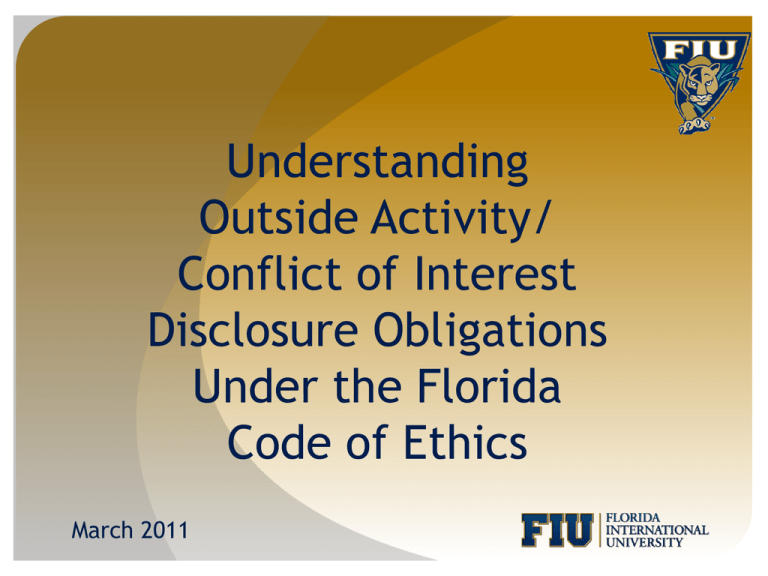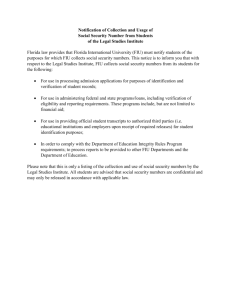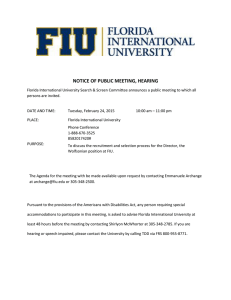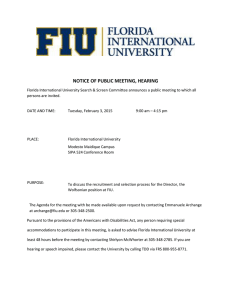Understanding Outside Activity/ Conflict of Interest Disclosure Obligations
advertisement

Understanding Outside Activity/ Conflict of Interest Disclosure Obligations Under the Florida Code of Ethics March 2011 Education Module Topics This Module covers: The basic conflict of interest requirements FIU faculty and staff need to follow under the State of Florida Code of Ethics for Public Officers and Employees. The University policies that implement the conflict of interest requirements. The restrictions and limitations for receipt of personal gifts. Outside Activity/Conflict of Interest Disclosure Obligations Stem From Federal regulatory requirements State law requirements University policies These policies capture your compliance obligations to disclose outside activities that may pose an actual or potential conflict. Outside Activity/Conflict of Interest Disclosure Obligations In order to comply with applicable federal and state laws, the University has policies and procedures in place, and now an electronic disclosure process that allows faculty and staff to disclose outside activities and financial interests that may constitute a conflict of interest between their personal interests and their public duties on behalf of FIU. We encourage you to review the two additional education modules to gain a better understanding of our disclosure obligations: For a description of the electronic portal disclosure process please review the Understanding the “Nuts and Bolts” of the Electronic Portal for Report of Outside Activity/Conflict of Interest Federal Law: Please review the Understanding Conflict of Interest Disclosure Obligations in Research University Conflict of Interest Policies Where can I find the Conflict of Interest (“COI”) policies: http://policies.fiu.edu/ Houses all official university policies and procedures, including all policies discussed here University Policies What are the University policies that address outside activities and conflicts of interest? In employment, there is a general policy as well as a policy for each of the collective bargaining agreements, as follows: Non-bargaining unit faculty and staff: http://policies.fiu.edu/files/106.pdf AFSCME: http://policies.fiu.edu/files/399.pdf PBA: http://policies.fiu.edu/files/579.pdf PBA Lts: http://policies.fiu.edu/files/640.pdf SEIU: http://policies.fiu.edu/files/285.pdf UFF: http://policies.fiu.edu/files/206.pdf University Policies (Cont’d) For our day-to-day business operations, there are two specific policies that address business ethics: Ethics in Purchasing and Gift Policy http://policies.fiu.edu/files/598.pdf Fraud Prevention and Mitigation Policy http://policies.fiu.edu/files/712.pdf For research policies, please refer to the Understanding Conflict of Interest Disclosure Obligations in Research education module. State of Florida Code of Ethics All Florida International University faculty and staff are subject to the State of Florida Code of Ethics for Public Officers and Employees (“Code of Ethics”). Chapter 112, Part III, Florida Statutes available at: http://www.leg.state.fl.us/statutes/index.cfm?App_mode=Display_Statute&URL=01000199/0112/0112PartIIIContentsIndex.html&StatuteYear=2010&Title=%2D%3E2010%2D%3EChapte r%20112%2D%3EPart%20III The Code of Ethics contains provisions that: prohibit certain actions or conduct or require that certain disclosures be made. Florida Code of Ethics (Cont’d) What actions are generally prohibited under the Code of Ethics? The general prohibitions center on: Misuse of official position Doing business with one’s agency (i.e., FIU) Holding positions or entering into contracts that create or constitute a conflict between one’s personal interests and public duties Misuse of Official Position As public employees, you cannot solicit or accept personal gifts or benefits (loans, services, discounts) if: based solely on the understanding that it will influence your official action you know or have reason to know that it is being given to influence your official action §112.313(3) and 112.313(4), Fla. Stat. Misuse of Official Position (Cont’d) The Code of Ethics also prohibits: disclosure of information acquired as part of your official duties for personal gain or for the benefit of any other person or business entity corruptly using or attempting to use your official position Florida Code of Ethics Basics Safeguarding University Resources FIU employees have a responsibility to safeguard university resources. As such, you need to be familiar with the types of improprieties that may occur within your areas of responsibility. In the event you become aware of improprieties, you must notify your supervisor or other designated university representative. See Fraud Prevention and Mitigation/University Responsibility and Response Policy. Florida Code of Ethics Basics Non-Retaliation The University has a strong non-retaliation policy for employees who, in good faith, report wrongful activities. In addition, since December 2009, FIU has in place an ethics hotline, provided through EthicsPoint, an independent, third party provider that allows for anonymous reporting. EthicsPoint can be accessed at http://www.fiu.ethicspoint.com Information about EthicsPoint, including FAQs, is available at http://compliance.fiu.edu/ethics_comp.htm Doing Business with One’s Agency (FIU) A business entity in which you, your spouse, or child owns more than a 5% interest may not do business with FIU (except under narrow circumstances). §112.313(3), Fla. Stat. This prohibition extends to doing business with the University in your private capacity. §112.313(3), Fla. Stat. This prohibition does not apply in circumstances such as the following: When the award is through a bid process that includes procedural safeguards When an emergency purchase must be made (health, safety, or welfare concern that must be documented) When the business entity is the sole source and there is full disclosure When the transactions do not exceed $500 in a calendar year Holding Positions or Entering into Contracts that Create Conflicts The Code of Ethics contains prohibitions on holding positions or entering into contracts that create conflicts between your personal and public duties. You may not be employed or do business with any entity that does business with the University. You may not have or hold any employment or contractual relationship that, would create a continuing or frequently recurring conflict between your private interests and the performance of your University position, or would impede the full and faithful discharge of your fiduciary obligations to the University. §112.313(7), Fla. Stat. Prohibitions/Limitations on Receipt of Personal Gifts Public officials and employees should: conduct themselves independently and impartially not use their offices for private gain not solicit or accept personal gifts or benefits if provided to influence official action Prohibitions/Limitations on Receipt of Personal Gifts (Cont’d) Additional restrictions apply if you are: a state “procurement employee” or a “reporting individual” If you are either of these, your ability to receive gifts from individuals or entities that are University vendors (in the past 12 months or trying to become a University vendor) is severely limited. Prohibitions/Limitations on Receipt of Personal Gifts (Cont’d) • How do you know if you are a “procurement employee”? • Quite simple - Do you participate in the purchase of contractual services or commodities which exceed $1,000 in any year? • If yes - you are a state procurement employee. Prohibitions/Limitations on Receipt of Personal Gifts (Cont’d) Who is a “reporting individual?” Anyone required by law to file an annual disclosure of financial interests with the Florida Commission on Ethics. FIU reporting individuals include: • • • • • board of trustees members • purchasing agents • finance/accounting president directors vice presidents • business managers deans • personnel officials legal counsel • grant coordinators Prohibitions/Limitations on Receipt of Personal Gifts (Cont’d) What are the restrictions? Procurement employees and reporting individuals cannot solicit any gifts for themselves or immediate family members from lobbyists or accept gifts greater than $100 from any lobbyist of the University. Reporting individuals cannot accept personal gifts from registered lobbyists in any amount. Prohibitions/Limitations on Receipt of Personal Gifts (Cont’d) A “lobbyist” is an individual, entity, corporation or group who, for compensation, seeks or sought during the preceding 12 months: to influence governmental decision-making or to encourage the passage, defeat, or modification of any proposal or recommendation A vendor to the University during the preceding twelve months, or an individual/entity trying to become a University vendor, is considered a “lobbyist.” Code of Ethics Guidance During the course of your employment at FIU, you may be presented with a business or employment opportunity, or a personal gift, for which you may need guidance regarding the scope and application of the Florida Code of Ethics to your specific situation. Please know that there are two offices that can assist you with this guidance. You may contact: Office of the General Counsel: 305-348-2103 University Compliance Office: 305-348-2216


